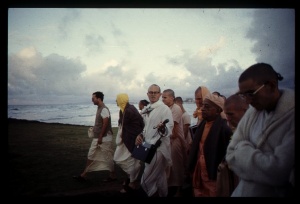SB 10.4.9: Difference between revisions
m (1 revision(s)) |
No edit summary |
||
| Line 1: | Line 1: | ||
{{info | {{info | ||
|speaker= | |speaker=Śukadeva Gosvāmī | ||
|listener=King | |listener=King Parīkṣit | ||
}} | }} | ||
[[Category:Srimad-Bhagavatam - Canto 10 Chapter 04|s09 ]] | |||
[[Category:Bhagavatam Verses Spoken by Sukadeva Gosvami - Vanisource|100409]] | |||
<div style="float:left">'''[[Srimad-Bhagavatam]] - [[SB 10|Tenth Canto]] - [[SB 10.4: The Atrocities of King Kamsa|Chapter 4: The Atrocities of King Kaḿsa]]'''</div> | |||
<div style="float:right">[[File:Go-previous.png|link=SB 10.4.8]] '''[[SB 10.4.8]] - [[SB 10.4.10-11]]''' [[File:Go-next.png|link=SB 10.4.10-11]]</div> | |||
{{RandomImage}} | |||
==== TEXT 9 ==== | ==== TEXT 9 ==== | ||
<div | <div class="verse"> | ||
sā tad-dhastāt samutpatya | :sā tad-dhastāt samutpatya | ||
sadyo devy ambaraṁ gatā | :sadyo devy ambaraṁ gatā | ||
adṛśyatānujā viṣṇoḥ | :adṛśyatānujā viṣṇoḥ | ||
sāyudhāṣṭa-mahābhujā | :sāyudhāṣṭa-mahābhujā | ||
</div> | </div> | ||
| Line 17: | Line 22: | ||
==== SYNONYMS ==== | ==== SYNONYMS ==== | ||
<div | <div class="synonyms"> | ||
''sā''—that female child; ''tat-hastāt''—from the hand of Kaṁsa; ''sam-utpatya''—slipped upward; ''sadyaḥ''—immediately; ''devī''—the form of a demigoddess; ''ambaram''—into the sky; ''gatā''—went; ''adṛśyata''—was seen; ''anujā''—the younger sister; ''viṣṇoḥ''—of the Supreme Personality of Godhead; ''sa-āyudhā''—with weapons; ''aṣṭa''—eight; ''mahā-bhujā''—with mighty arms. | |||
</div> | </div> | ||
| Line 24: | Line 29: | ||
==== TRANSLATION ==== | ==== TRANSLATION ==== | ||
<div | <div class="translation"> | ||
The child, Yogamāyā-devī, the younger sister of Lord Viṣṇu, slipped upward from Kaṁsa's hands and appeared in the sky as Devī, the goddess Durgā, with eight arms, completely equipped with weapons. | The child, Yogamāyā-devī, the younger sister of Lord Viṣṇu, slipped upward from Kaṁsa's hands and appeared in the sky as Devī, the goddess Durgā, with eight arms, completely equipped with weapons. | ||
</div> | </div> | ||
| Line 31: | Line 36: | ||
==== PURPORT ==== | ==== PURPORT ==== | ||
<div | <div class="purport"> | ||
Kaṁsa tried to dash the child downward against a piece of stone, but since she was Yogamāyā, the younger sister of Lord Viṣṇu, she slipped upward and assumed the form of the goddess Durgā. The word anujā, meaning "the younger sister," is significant. When Viṣṇu, or Kṛṣṇa, took birth from Devakī, He must have simultaneously taken birth from Yaśodā also. Otherwise how could Yogamāyā have been anujā, the Lord's younger sister? | Kaṁsa tried to dash the child downward against a piece of stone, but since she was Yogamāyā, the younger sister of Lord Viṣṇu, she slipped upward and assumed the form of the goddess Durgā. The word ''anujā'', meaning "the younger sister," is significant. When Viṣṇu, or Kṛṣṇa, took birth from Devakī, He must have simultaneously taken birth from Yaśodā also. Otherwise how could Yogamāyā have been ''anujā'', the Lord's younger sister? | ||
</div> | </div> | ||
__NOTOC__ | |||
<div style="float:right; clear:both;">[[File:Go-previous.png|link=SB 10.4.8]] '''[[SB 10.4.8]] - [[SB 10.4.10-11]]''' [[File:Go-next.png|link=SB 10.4.10-11]]</div> | |||
__NOTOC__ | |||
__NOEDITSECTION__ | |||
Revision as of 03:29, 19 May 2021

A.C. Bhaktivedanta Swami Prabhupada
TEXT 9
- sā tad-dhastāt samutpatya
- sadyo devy ambaraṁ gatā
- adṛśyatānujā viṣṇoḥ
- sāyudhāṣṭa-mahābhujā
SYNONYMS
sā—that female child; tat-hastāt—from the hand of Kaṁsa; sam-utpatya—slipped upward; sadyaḥ—immediately; devī—the form of a demigoddess; ambaram—into the sky; gatā—went; adṛśyata—was seen; anujā—the younger sister; viṣṇoḥ—of the Supreme Personality of Godhead; sa-āyudhā—with weapons; aṣṭa—eight; mahā-bhujā—with mighty arms.
TRANSLATION
The child, Yogamāyā-devī, the younger sister of Lord Viṣṇu, slipped upward from Kaṁsa's hands and appeared in the sky as Devī, the goddess Durgā, with eight arms, completely equipped with weapons.
PURPORT
Kaṁsa tried to dash the child downward against a piece of stone, but since she was Yogamāyā, the younger sister of Lord Viṣṇu, she slipped upward and assumed the form of the goddess Durgā. The word anujā, meaning "the younger sister," is significant. When Viṣṇu, or Kṛṣṇa, took birth from Devakī, He must have simultaneously taken birth from Yaśodā also. Otherwise how could Yogamāyā have been anujā, the Lord's younger sister?